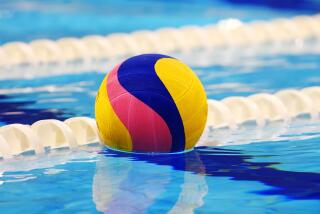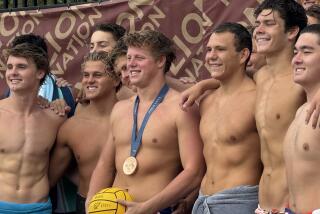Pool of Talent : Spain’s Estiarte Is Tops on One of Top Water Polo Teams
- Share via
Miguel Chillida, an Olympic water polo player turned Barcelona lawyer, recently filed papers for an accident claim in which he was the victim.
To bolster the charge that his athletic career was ruined because of an auto accident, he carried old news clippings and a certificate from the Spanish water polo federation.
That was all the proof the court clerks needed. They clamored for his autograph.
Chillida laughed when recounting the case of mistaken identity. The clerks were not interested in Chillida, a good, but by no means well-known, player.
In Spain, where water polo results are relegated to the fine print in newspapers, there is only one athlete who could cause such a commotion: Chillida’s friend, Manuel Estiarte.
The face might not be that familiar to the public, but practically everyone in the land of bullfighting knows the name. When the court workers saw the water polo articles, they assumed Chillida was the famous Olympian.
Strange, but Chillida experienced a similar scenario in a downtown bank the same week. He could tell that the Olympics were on everyone’s mind.
And when the Spanish consider Olympic feats, few other natives rival Estiarte’s exploits. He has been a high-scoring driver on the national team for 15 of his 30 years, and in that time, has been the leading scorer in three Olympics. He hopes to make it five by the time he retires.
“He must make history,” said Dragon Matutinovich, Spain’s coach.
But as Spain developed into one of the world’s best teams, which the Spanish hope will result in a gold medal at the Barcelona Games, Estiarte had to alter his shoot-till-you-drop style. The world’s greatest scoring threat--the Michael Jordan of water polo--was eclipsed by teammates.
“He is very intelligent,” Chillida said from Barcelona. “He knows he can’t play like he did 10 years ago.”
Ten years ago, Estiarte was Spain’s offense. As a result, the Spanish were explosive one game, ineffective the next. While Estiarte was reaping individual accolades, the team rarely threatened to win international tournaments.
That changed when a group of talented players from Madrid were promoted to the national team three years ago. They were outsiders because until then, Spain’s best players came from the Catalan region surrounding Barcelona. Estiarte, for instance, was from Manresa, the center of the Bajes just north of Barcelona.
“They had a different attitude,” Chillida said of the Madrid youngsters.
They represented a fresh approach to Spain’s game. No one intimidated them, not even Estiarte, who played in every major international tournament since after the 1976 Olympics.
“If Manuel would take a difficult shot, they would tell him,” Chillida said.
They also showed him by refusing to pass him the ball. When putsch came to shove, Estiarte’s choices were limited--adapt or retire.
Estiarte stayed and, though he shot less, still scored with regularity. With more players involved in the offense, Spain finished second to Yugoslavia at the 1991 World Championships in Perth, Australia, their best placing in a major tournament.
Spain’s rise started about the time Matutinovich, a former Yugoslav coach, took over the program. Some, in fact, credit him more so than the players from Madrid.
“He’s crazy,” Chillida said.
Matutinovich recently took the team to a training camp in the tiny mountain nation of Andorra. He wanted the players far from the pressures of Barcelona, which is dressing itself for Olympic festivities.
The team stayed in the Andorran Pyrenees for 20 days. No family. No friends. No pool. Just daily runs in high altitude. Veteran players were not used to the austere surroundings, but no one dared challenge Matutinovich even if they thought his tactics were a bit rigid.
Matutinovich, the martinet, had one ally who understood his methods. Estiarte employed similar training techniques to perfect his skills.
When he was 18, he spent a year in North Africa with the Spanish armed service. Although unable to play during his tenure, he returned to the national team in fine shape.
“It is why I can play for so long,” he said.
Estiarte has maintained a high level for 15 years despite the beating he takes from opponents who try anything and everything to stop him. Rich Corso, coach of Harvard-Westlake High and the Canadian national team, said the Soviets used to assign their biggest players to guard the slight, but strong, Estiarte.
“They’d just pound him,” Corso said. “He has taken physical abuse (like that) over the years (yet) he hasn’t lost any speed.”
Estiarte shrugs, saying water polo is a rough game. He can expect more of the same this summer now that Spain is one of the Olympic favorites because of the breakup of Yugoslavia.
Bill Barnett, coach of the U.S. team, which finished second to Yugoslavia in the last two Olympics, has assigned defense specialists Erich Fischer and Craig Wilson to the monumental task of slowing Estiarte.
“He’s great at luring you in, faking and going right by you,” Fischer said of Estiarte. “You’re thinking, ‘I’ve got to give him some room.’ Then he starts faking. As soon as you get too close to him, he’s got you where he wants.”
Defense specialists foul their opponents with regularity in attempting to prevent easy shots. But Fischer said that tactic is not necessarily effective against Estiarte.
“His hands are so quick that it is hard to foul him or knock the ball away,” Fischer said. “His hands move so much, he gets the goalie totally out of position.”
All this free-lance movement drives Wilson batty. As the world’s preeminent goalie, Wilson has faced every kind of scorer, but none with Estiarte’s unpredictability. It is not unusual for Estiarte to shoot from well outside the normal range.
Wilson normally does not track those who score against him. But when he faces Estiarte, whether in an international tournament or at the professional club level in Italy, Wilson makes mental notes of goals scored.
“Any time he has his hands on the ball, the coaching staff will let him shoot,” Wilson said. “If he is inside the 10-meter line, I’m glued to him.”
Even when Estiarte is away from the action, Wilson tries to monitor his movement.
“If I took my eye off him for a second, he is fast enough where he’ll flick his wrists and the ball will be coming toward the goal,” Wilson said. “He’s done it to me before.”
Wilson would gladly be rid of this prolific scorer, but Estiarte sees no reason to quit.
“I feel the same as when I was 15,” he said.
He’s not the same, really. All these years of competition have shaped him. When he started he was good but not a leader. Today he is the soul of Spain’s team.
“He’s a very extroverted person, open and positive,” his mother, Duocastela said, speaking in Spanish from Manresa. “He transmits this joy to his friends. He tries to make jokes.”
Three years ago, when Spain traveled to Stockholm for a winter tournament, Estiarte was walking along a frozen river with teammates. When the Spaniards needed to reach the other side, Estiarte, their captain, had the solution.
“Manuel said we should cross the river,” recalled Pere Robert, an assistant coach.
The other players were hesitant, looking for a bridge. But Estiarte, ever the instigator, insisted it was safe. He walked to the middle to show them. That’s when the ice shattered and he fell through.
“He was crying for help, but all the team was smiling,” Robert said.
After he stroked his way to safety, a drenched and shivering Estiarte was fortunate not to suffer frostbite, but he, too, was smiling.
Estiarte’s outgoing nature has shielded him during turbulent times. Friends said he tried to stay upbeat when his older sister, Rosa, died after falling out a window years ago. She was 25. The death was listed as an accident but remains mysterious, friends said.
Estiarte did not discuss Rosa’s death with many although it affected him. He started swimming at 3 because Rosa and older brother Alberto competed at the neighborhood aquatics club.
“Perhaps he was upset for a very long time, but you didn’t see him depressed,” Chillida said.
Said Corso: “No one (in water polo) heard much about the death.”
Estiarte, who lives with his Italian wife, Sylvia, and daughter, in Pescara, Italy, only said the family wants to forget the incident.
Friends suggest all those yards he swims daily have helped dull the pain.
He prefers recounting the pleasant moments of childhood when discussing his past. Most memories involve water polo. Estiarte has played since he was a child when Alberto suggested one day he could be successful.
“I believed him,” said Estiarte, then a promising butterflyer.
He quit swimming and never considered the consequences. It seems so long ago, he said.
In fact it is.
Times staff writer Kevin Baxter contributed to this story.
More to Read
Go beyond the scoreboard
Get the latest on L.A.'s teams in the daily Sports Report newsletter.
You may occasionally receive promotional content from the Los Angeles Times.






